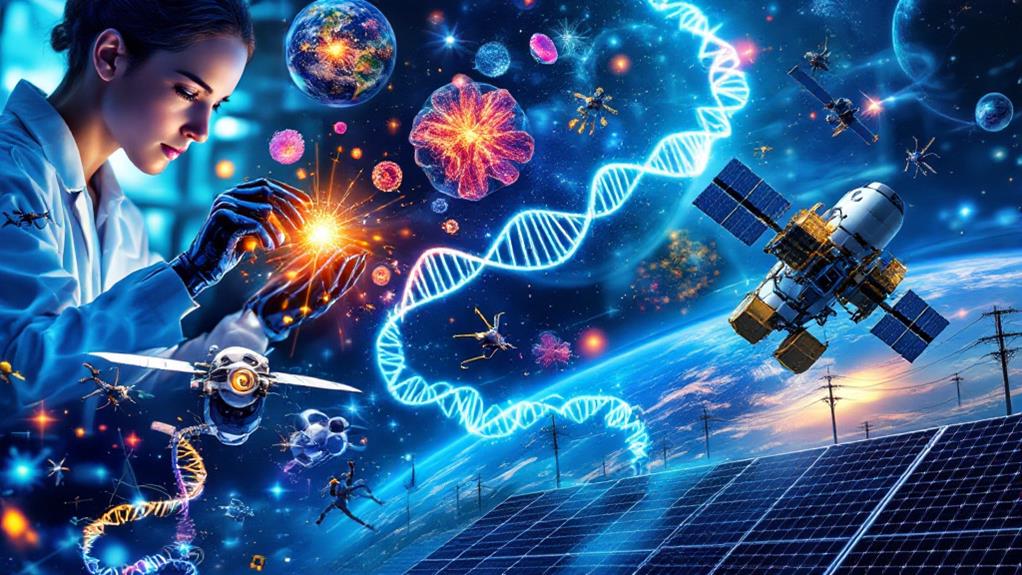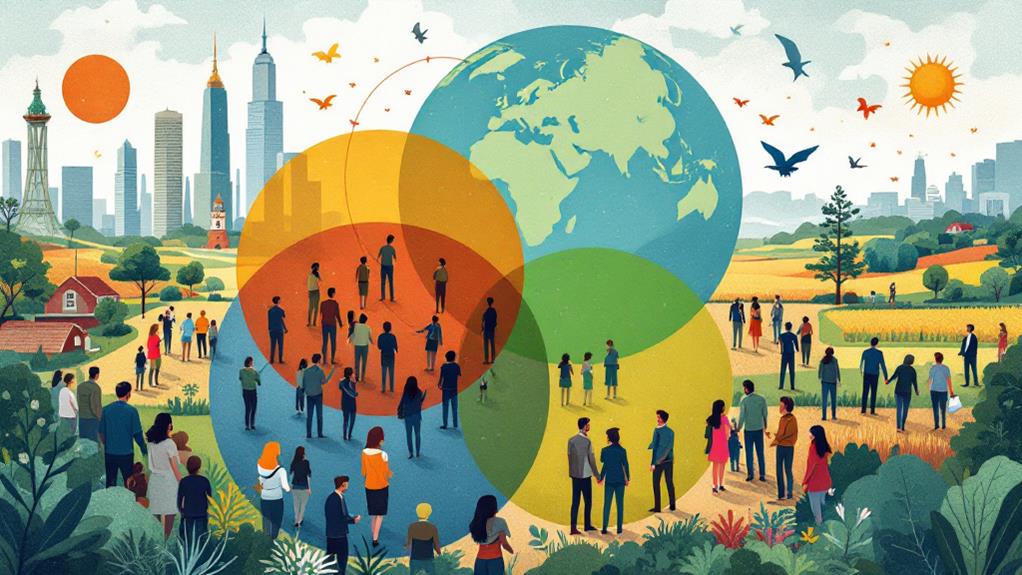Some of the Greatest Science Discoveries in Recent Years: Innovations Changing the World

You're living in an age of monumental science revelations that are transforming the world. CRISPR technology gives you unprecedented control over DNA, pushing gene therapy and agriculture to new heights. Breakthroughs in quantum computing offer unmatched computing power, tackling challenges previously beyond reach. AI is reshaping industries, from healthcare's early diagnoses to personalized services. Renewable energy innovations lead a greener future with more efficient solar panels and biofuels. Space exploration broadens horizons with Mars missions and advanced satellites, while nanotechnology improves everyday materials and environmental sustainability. Curious about how these revelations are shaping your world? You'll find it fascinating.
CRISPR Gene Editing Advancements
CRISPR gene editing is altering the field of genetics, offering unprecedented control over DNA. You can now investigate CRISPR's applications in multiple domains, from gene therapy to agricultural advancements. In precision medicine, CRISPR enables you to target specific genetic mutations, potentially transforming the treatment of diseases. However, ethical considerations arise, especially when you think about the possibility of editing human embryos or creating designer babies. It's vital for you to weigh these concerns as advancements continue.
In agriculture, CRISPR allows you to improve crop resistance, enhance yield, and even fortify nutritional content. But remember, off-target effects, where unintended DNA segments are altered, pose significant challenges. It's important to develop methods to minimize these risks and guarantee the technology's safety.
When it comes to microbial editing, CRISPR opens doors for you to modify bacteria for industrial applications, such as biofuel production or environmental cleanup. Yet, with these innovations, regulatory frameworks need to evolve to address safety and ethical issues. As you engage with CRISPR's potential, balancing innovation with responsibility is key to harnessing its full potential while maintaining public trust and safety.
Breakthroughs in Quantum Computing
Quantum computing represents a revolutionary leap in computational power and efficiency, promising to solve problems far beyond the reach of classical computers. As you explore this cutting-edge field, you'll uncover that quantum computers harness the principles of quantum mechanics, such as superposition and quantum entanglement, to process information in ways that defy traditional logic. These devices aren't just faster; they're fundamentally different, enabling you to tackle complex tasks like molecular modeling and cryptography with unprecedented speed.
A key milestone in this domain is quantum supremacy, where a quantum computer performs a calculation that classical computers can't match. In recent years, researchers have made significant strides, with companies like Google claiming to have achieved this landmark. This breakthrough has profound implications for industries reliant on massive data processing and problem-solving capabilities.
Quantum entanglement, another fascinating aspect, allows particles to remain interconnected, even over vast distances. By exploiting this phenomenon, you can improve communication security, creating unhackable networks. While challenges remain, such as error rates and maintaining quantum coherence, the potential applications for quantum computing are vast. Welcome this expedition, as it promises to redefine what's possible in technology and science.
Progress in Artificial Intelligence

Artificial intelligence (AI) is transforming industries at an astonishing pace, reshaping the way we interact with technology and each other. You've likely encountered AI without even realizing it. From personalized recommendations on streaming services to voice assistants on your phone, AI's reach is vast. At its core, machine learning—a significant component of AI—allows systems to learn and improve from experience, without explicit programming. This means the more data AI systems process, the smarter they become, enhancing performance in real-time.
Neural networks, inspired by the human brain's structure, play an important role in this evolution. They enable machines to recognize patterns and make decisions with remarkable accuracy. For example, neural networks are behind facial recognition technology, helping you tag friends in photos or access your smartphone effortlessly. In healthcare, AI's progress is nothing short of revolutionary. Machine learning algorithms can analyze medical images faster and more accurately than ever before, aiding early diagnosis and treatment planning.
As you navigate this rapidly evolving landscape, embracing AI's potential is fundamental. By understanding these advancements, you can harness AI's power to improve efficiency, drive innovation, and shape a future that's increasingly intelligent and interconnected.
Discoveries in Renewable Energy
While AI is reshaping industries with its intelligent capabilities, another likewise transformative field is making strides in how we power our world: renewable energy. You've probably noticed solar energy panels popping up on rooftops and wind turbines dotting landscapes. These technologies are becoming increasingly efficient, helping to reduce reliance on fossil fuels. But it doesn't stop there.
Biofuels are transforming transportation by providing cleaner alternatives to gasoline. Meanwhile, energy storage advancements are ensuring that renewable energy can be used even when the sun isn't shining or the wind isn't blowing. Think of batteries that store excess solar or wind power for future use. Hydropower remains a steady source of clean energy, with innovations making it more efficient and less environmentally disruptive.
Geothermal energy is tapping into the Earth's natural heat, offering a consistent and sustainable power source. Smart grids are modernizing how electricity is distributed, making it possible to manage energy use more efficiently and integrate renewable sources seamlessly. And let's not forget about sustainable materials—engineers are creating components that are not only efficient but also environmentally friendly, ensuring that the shift to renewable energy is as green as possible.
Innovations in Space Exploration

Humanity's curiosity about the cosmos has fueled remarkable innovations in space exploration. You've probably heard of Mars missions, which aim to uncover the mysteries of the Red Planet. Recent advancements in satellite technology have transformed our ability to study Earth from afar and observe other celestial bodies. These satellites provide essential data for everything from weather forecasting to global communications.
Space telescopes, like the James Webb Space Telescope, offer a window into the distant universe, allowing you to witness the birth of stars and galaxies. On the lunar exploration front, missions are underway to return humans to the Moon, paving the way for a sustainable presence and expanding your understanding of our closest celestial neighbor.
Asteroid mining is another exciting frontier. Imagine extracting valuable resources from these space rocks, potentially transforming industries on Earth. Space tourism is no longer a distant dream; companies are actively planning to take you on an expedition beyond our atmosphere, offering a unique perspective of our planet. Finally, tackling cosmic radiation remains essential for ensuring the safety of astronauts venturing into deep space. Each innovation brings you closer to unraveling the universe's secrets, making space exploration a continuously changing adventure.
Advances in Nanotechnology
Nanotechnology often revolutionizes the way you interact with the world by manipulating matter on an atomic and molecular scale. Imagine materials stronger than steel but incredibly lightweight. That's what nanomaterials applications can offer. In everyday life, these applications span from scratch-resistant coatings on your gadgets to more efficient solar panels powering your home. With nanotechnology, the potential seems limitless, pushing boundaries in industries you might not even expect.
Nanoscale imaging plays an essential role in understanding how these tiny materials behave. Think of it as a microscope that lets you see the unseen. By providing incredibly detailed views of material structures, nanoscale imaging helps researchers tailor nanomaterials for specific purposes. This precision means better batteries that last longer or fabrics that repel stains and water. You're benefiting from innovations you can't even see.
Moreover, nanotechnology improves environmental sustainability. By developing nanomaterials that efficiently capture pollutants, you get cleaner air and water. In electronics, it leads to devices that consume less energy, contributing to a greener planet. As you adopt these advancements, remember they're reshaping your world, making it more sustainable and efficient—one atom at a time.
Developments in Medical Science

Just as nanotechnology has transformed our daily lives, medical science is undergoing a remarkable evolution that impacts your health and well-being. One of the most significant advancements is personalized medicine. Imagine treatments specifically tailored to your genetic makeup. These aren't just dreams of the future; they're becoming a reality. Personalized medicine allows for more effective and targeted therapies, reducing trial and error in treatment plans. It's changing how doctors approach diseases like cancer, where genetic profiles can guide precise interventions.
Another groundbreaking change is the rise of telehealth solutions. You're no longer restricted by geography when seeking medical advice. With telehealth, you can access healthcare professionals from the comfort of your home. It's a game-changer for those in remote areas or with mobility issues. Video consultations, remote monitoring, and digital health records streamline the process, making it easier and faster for you to receive the care you need.
These developments aren't just about technology; they're about improving your life. By embracing personalized medicine and telehealth solutions, you're part of a medical revolution that's making healthcare more accessible, efficient, and tailored to your unique needs.



